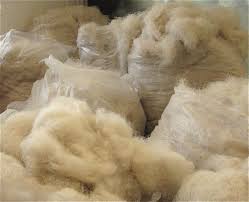
BKS, first company to start processing pashmina wool in Nepal
YarnsandFibers News Bureau 2014-01-13 17:00:00 – KATHMANDUByabasayik Krishi Sahakari, (BKS) an agricultural cooperative, has recently started processing the wool collected from goats known as chyangra which dwell in the high hills in Mustang district. It is the first company to process pashmina wool.
Jyoti Prasad Adhikari, chairman of the cooperative, said they imported a Chinese machine at a cost of Rs 1.5 million and installed it at their factory in Baluwatar. The processing plant has a capacity of producing 600-700 kg of quality wool per hour.
They have collected 600-700 kg of pashmina wool from the local people of Mustang as a start. The company was coordinating with farmers in Mustang and Upper Mustang for a regular supply of raw wool, he added.
Adhikari said that they had targeted utilizing the wool of chyangras and yaks that were either going to waste or being bought by Chinese traders at cheap prices. Pashmina is one of Nepal’s largest exportable items. According to the Trade and Export Promotion Centre, the country exported pashmina products worth Rs 2.17 billion in 2012-13. Nepal has been depending mostly on China for the raw material used to make pashmina products.
A study report of the International Trade Centre, a subsidiary of the World Trade Organization, shows that there are around 300,000 chyangras being reared in the high hilly regions including Mustang, Humla, Mugu and Dolpa districts. As per the study, 55,000 chyangras are being raised in Mustang district alone. An estimated 8 tonnes of pashmina wool can be produced out of them annually.
Pushpa Man Shrestha, president of the Nepal Pashmina Industries Association, said that processing pashmina wool locally could help to reduce prices of quality pashmina yarn.
According to him, an estimated 100 tonnes of pashmina wool and yak wool are imported from China annually. The imported pashmina yarn costs Rs 14,000-15,000 per kg. If the raw material is produced domestically, the cost can be reduced by almost half, ensuring greater competitiveness of Nepali pashmina in the international market.
Even though pashmina products are one of the major exportable items, the raw material is not produced locally and has to be imported.
Market Intelligence
Ask for free sample Report

experience
Customer Base
dedicated team
Countries Served Worldwide









